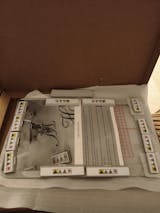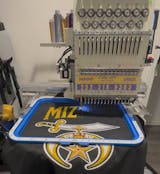1. Introduction to Ricoma EM-1010: Bridging Hobbyist and Commercial Needs
The Ricoma EM-1010 stands out as a flexible single-head machine for home-based creators and small business owners. Its 10-needle architecture and 1,000 stitches per minute speed balance intricate, multi-color work with efficient production, letting you move from prototypes to paid orders without switching platforms.
Built for modern embroiderers, the EM-1010 blends precision and usability. Across the guide below, you will find key specifications, maintenance best practices, ROI considerations, and techniques that show how this model punches above its weight.
Table of Contents
- 1. Introduction to Ricoma EM-1010: Bridging Hobbyist and Commercial Needs
- 2. Technical Deep Dive: EM-1010 Specifications and Operational Excellence
- 3. Assembly to Maintenance: Ensuring Long-Term Machine Health
- 4. Business Viability Analysis: When Does the EM-1010 Shine?
- 5. Advanced Techniques: Pushing EM-1010 to Its Limits
- 6. Software Integration: Beyond ChromaLuxe Basics
- 7. Conclusion: Strategic Positioning in the Embroidery Market
- 8. FAQ: Answering Top EM-1010 Queries
2. Technical Deep Dive: EM-1010 Specifications and Operational Excellence
2.1 Core Features: 10-Needle System and 1,000 SPM Performance
The 10-needle setup enables fast color changes and complex motifs without manual swaps, while 1,000 SPM maintains throughput on large batches. Servo motors and a Japanese Koban hook deliver consistent stitch quality. A 7-inch HD touchscreen supports quick edits, sizing, and layout tweaks. The machine is also optimized for consistent hooping and even tension when paired with sewtalent magnetic hoops, improving stability on garments and speeding setup.
2.2 Threading Mechanics and Tension Calibration Protocols
Threading follows a clear path from cones to rack to tensioners, where balanced tension is essential for clean results. Manual tension dials allow precise adjustments, and the thread break detection system pauses stitching when breaks occur for fast recovery. Using magnetic hoops for embroidery machines helps maintain uniform pressure across the field, further reducing errors.
3. Assembly to Maintenance: Ensuring Long-Term Machine Health
3.1 Proven Setup: Stand Assembly and Thread Rack Configuration
Assembly is straightforward: secure the stand, then configure the thread rack for smooth feed and easy access. Tool-free magnetic mounting reduces stress on the machine and speeds repeatable positioning, especially with magnetic embroidery hoops.
3.2 4-Hour Oiling Cycles and Thread Break Diagnostics
Oiling every four hours of run time keeps moving parts lubricated and reliable. The EM-1010 detects thread breaks and pauses automatically, enabling quick fixes. Consistent hoop pressure and clean threading paths are essential for minimizing breaks; many Ricoma users also standardize on accessories like ricoma embroidery hoops to keep results uniform.
4. Business Viability Analysis: When Does the EM-1010 Shine?
The EM-1010 offers an approachable path for hobbyists and small businesses to scale beyond single-needle limitations. Its speed, needle count, and workflow features translate into practical time savings.
4.1 ROI Breakdown: Comparing 10-Needle vs Single-Needle Output
With 10 needles and 1,000 SPM, the EM-1010 completes multi-color jobs much faster than single-needle machines that require frequent rethreading. Handling a 50-cap order is significantly quicker, which increases capacity and reduces labor per unit. The onboard storage supports large stitch counts, and at 99 lbs it remains mobile-friendly.
| Metric | EM-1010 | Brother PE800 |
|---|---|---|
| Needles | 10 | 1 |
| Speed | 1,000 SPM | 400–500 SPM |
| Design Capacity | 20 million stitches | Limited storage |
| Portability | 99 lbs (mobile-friendly) | Lighter but less powerful |
While the Ricoma EM-1010 price may be higher than single-needle units, the throughput and reduced manual intervention improve payback timelines for growing shops.
4.2 Niche Dominance: Why Startups Choose EM-1010 Over TC1501
For garment-focused work, the EM-1010 offers a cost-effective mix of power and simplicity. It provides 220-degree cap rotation, which covers front panels well, while some industrial machines like the TC1501 reach 270 degrees and a larger area at greater cost. Garment-oriented magnetic hoops provide a fast, stable alternative to a traditional embroidery frame, reducing stress and setup time.
5. Advanced Techniques: Pushing EM-1010 to Its Limits
5.1 Velcro Patch Production: Stabilizer Stacking Strategies
Velcro patches start with design setup on the 7-inch touchscreen. Use polypropylene sheets as the stabilizer base, twill fabric with basting spray for temporary hold, and plan placement and tack-down stitches. After stitching, trim and remove excess stabilizer for crisp edges. Strong-grip magnetic hoops keep multilayer stacks stable through the entire sequence.
5.2 Mixed-Material Mastery: Leather/Textile Hybrid Workflows
For leather and textile combinations, select sharp, heavy-duty needles and durable polyester thread, then fine-tune tensions to match thickness. PPSU hoops help prevent leather slippage and keep tension consistent. In demanding workflows, adding magnetic frames for embroidery machine setups can further stabilize tricky pieces and speed repeatable placements.
6. Software Integration: Beyond ChromaLuxe Basics
The EM-1010 works with ChromaLuxe and third-party tools to streamline complex jobs. On-screen editing supports resizing, duplication, rotation, and automatic color changes. For outside digitizing, PES and DST imports are supported, though adjusting stitch density and handling potential thread breaks may be needed after transfer. These features, combined with consistent hooping using a reliable magnetic embroidery hoop, make advanced workflows approachable.
7. Conclusion: Strategic Positioning in the Embroidery Market
The Ricoma EM-1010 bridges passion and profit with a 10-needle, 1,000 SPM platform, servo-driven precision, and a Koban hook. Its user-friendly touchscreen, thread break detection, and efficient hooping options help creators and small businesses expand output while protecting quality. Magnetic hoops reduce setup time and stress, supporting long-term reliability and a compelling ROI.
8. FAQ: Answering Top EM-1010 Queries
8.1 Q: How often should I perform maintenance on the EM-1010?
A: Oil the machine every four hours of operation to keep parts lubricated and reduce the chance of thread breaks.
8.2 Q: Is the EM-1010 suitable for cap embroidery?
A: Yes. It offers 220-degree cap rotation, which covers front panels well. For more extensive wrap-around designs, a larger rotation machine such as the TC1501 may be preferable.
8.3 Q: Can the EM-1010 integrate with design software beyond ChromaLuxe?
A: Yes. It works with third-party tools and supports PES and DST file formats, with manual adjustments like density tweaks often recommended after import.




